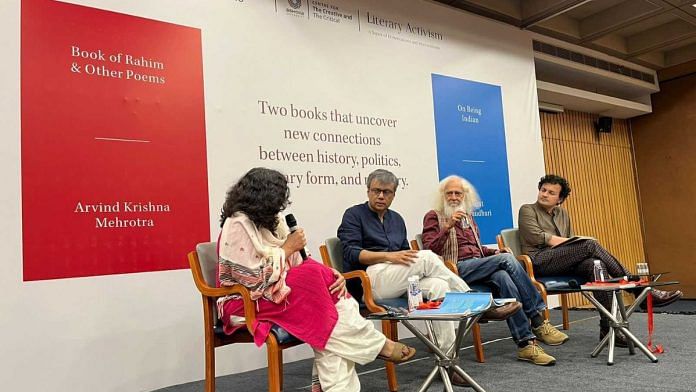Poet Arvind Krishna Mehrotra and author Amit Chaudhuri are turning to literature as an answer to rising communalism and shrinking space for dissent. Both men recently released new works—Mehrotra’s Book of Rahim and Other Poems and Chaudhuri’s On Being Indian—under Westland Books’ new imprint, Literary Activism.
Their volumes of essays and poems aim to uncover new connections between history, politics, literary form and memory. And they got together at New Delhi’s India International Center on 22 August to discuss how literature can be viewed from the lens of national identity. Mehrotra and Chaudhury spoke about how literature can be a site of protest that has the power to cause disruption and discomfort, leaving the reader feeling “out of sorts”.
But first, Chaudhuri, who is editor of the Literary Activism series, argued that literature had to be freed from the shackles of the elite. He bemoaned the rising barriers around literature and how over the last 30 years it has been “usurped” by publishing houses, media, and academia. “It is now controlled by an elite few,” he said.
Westland’s Literary Activism series, co-produced by Ashoka University, where Chaudhuri is director of the Centre for the Creative and the Critical, is an attempt to “challenge the academic monopolisation of literature, liberate it from the clutches of the elite, and take it back to the masses.”
Members of the audience, which included poet and activist Akhil Katyal and authors Akshaya Mukul and Ajay Vajpaye nodded in agreement.
Chaudhury railed against how capitalism is marketed using liberal aesthetic.
“Writers don’t teach literature anymore. It is now taught by a professional class of people who care more about the market of literature than literature itself. In most of this, literature was reinvented according to market needs and standards,” Chaudhuri said. “Inversion of the elite, only furthered the interests of the market.”
Also read: London, NYC, Taiwan—Bengali filmmaker a toast of the world. But he’s all about power of local
Activism of poem and prose
On Being Indian was originally a talk Chaudhuri had delivered at Jamia Millia Islamia University in February 2020, which was then published as an essay in the international quarterly journal Social Research. Part analysis, part history, and part literary criticism, the Sahitya Akademi awardee delves into what it means to be Indian in the backdrop of recent events such as the Citizenship Amendment Act and the pandemic-induced lockdown.
Book of Rahim—Mehrotra’s first collection of poems published after 25 years—explores national identity through the lens of the past. And he does it through Rahim’s dohas and Ghalib’s verse. “Without learning, without intelligence/ without faith, fame, or benevolence / you’re no better than an animal without tail or horn/Why do you walk on two legs at all?” Rahim says.
Mehrotra captivated the audience with his poems laden with anecdotes and the history of literary activism. When he finished reading his poem Lahore, everyone in the audience clapped heartily.
In his essay at the end of the slim volume, Mehrotra talks about his ancestral house in Lahore with its gatepost that reads, Pakistan India/ People’s Forum for Peace and Democracy.
Chaudhuri emphasised that literature can incorporate religion to produce works that not only challenge communalism, but also loosen the hold of elite academia on literature in the country.
Through a passage from his book, he argues that India’s religious inheritance is proof of a “tradition of rationality within religion, expressed over millennia through philosophical tracts, songs and poems”. They are used as forms of dissent and can even counter communalism and xenophobia.
“Xenophobia wasn’t fought in the anti-CAA protests through historic syncretism— an old cliche of seminar rooms— attributed to religions in India. It was fought through religion’s historic access, in this country to rationality,” he said.
Also read: The idea of a new Constitution is extremely dangerous. India doesn’t want dictatorship
All at sea
But for many in the audience, the session’s theme was lost in translation. What started out as a case against the ‘academicisation’ of literature and the need to rescue it from market demands, soon lost its way when terms such as ‘purposive purposelessness’ and ‘Kantian reasoning’ began to be used.
And he did not take well the counter-argument that the literary activism project was similarly limited to an elite crowd.
“The anti-elitist argument is a mainstay of the globalised elite and the Right to shut the uncultured. What we are proposing is not elite. It is a kind of eccentricity that is shared by writers across the board whether they are Vinod Kumar Shukla, Arvind or Namdeo Dhasal… people who dissent against the very narrow way of understanding the role culture plays,” he said.
It left many of New Delhi’s elite, who had gathered for the discussion, bemused if not disgruntled and disinterested. When the event’s moderator Saikar Majumdar, professor at Ashoka University, began a discussion on alternative spaces and reasons, one audience member whispered to the person sitting next to him, “I don’t understand what he is saying.”
An earlier version of the article incorrectly identified Amit Chaudhuri as Indian-American. The error is regretted.
(Edited by Ratan Priya)



